Recognizing the importance of honoring the elderly is a vital aspect of the Christian faith. Many scriptures emphasize respect for older individuals, highlighting the wisdom and experiences they bring to communities.
Understanding this calling can lead to tangible actions that support and uplift seniors, enriching both their lives and the lives of those around them.
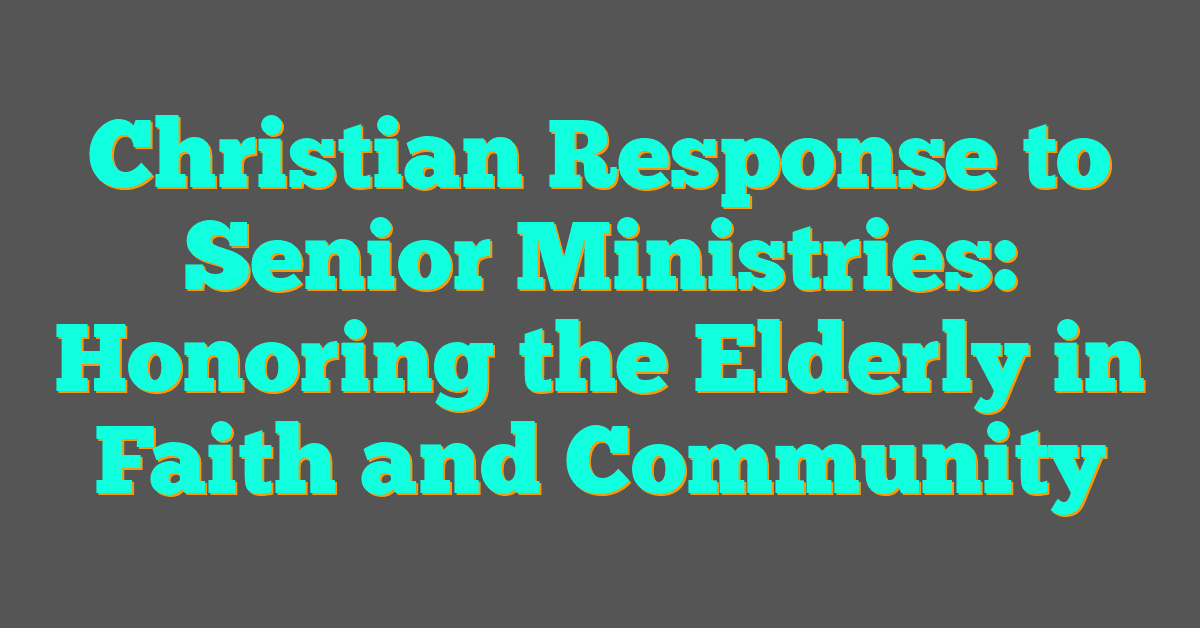
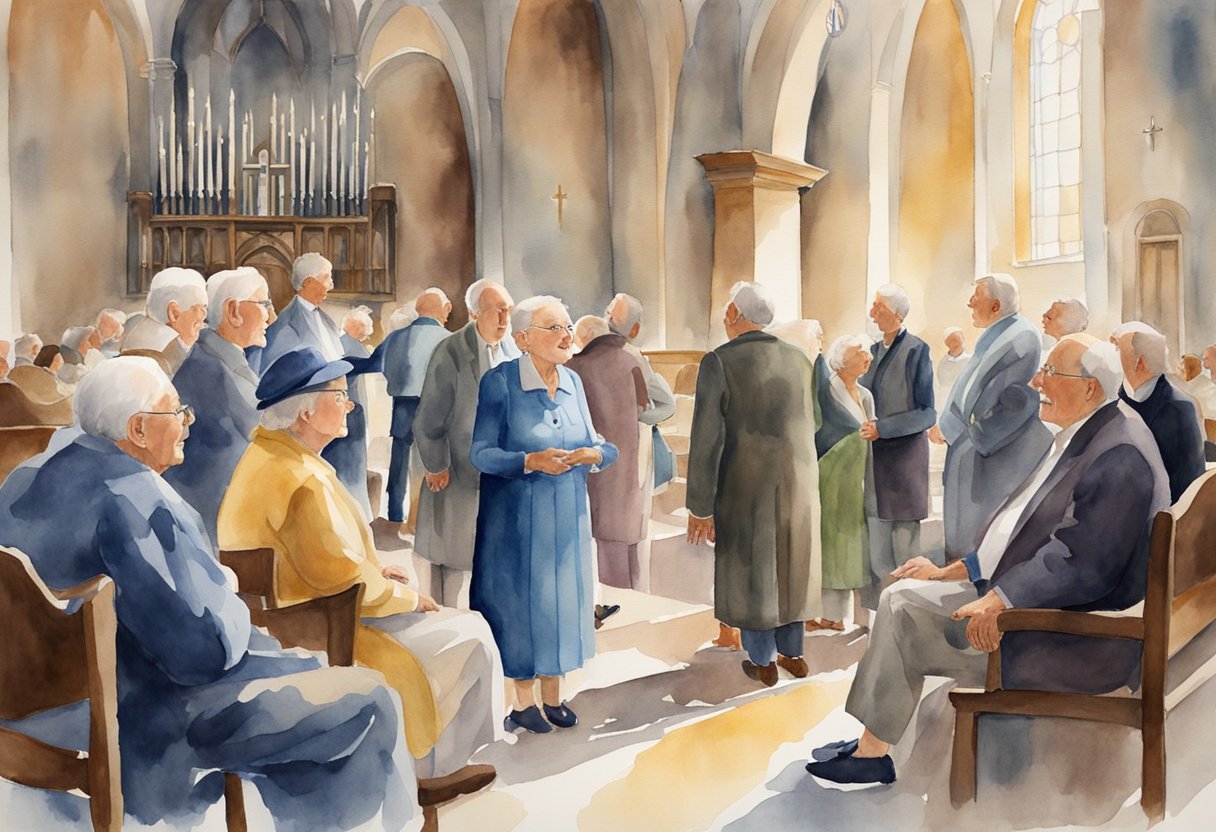
The church plays a crucial role in fostering relationships between generations. By engaging in senior ministries, communities can ensure that the elderly feel valued and integrated into church life. These interactions not only honor their contributions but also provide important opportunities for younger members to learn from their elders.

Supporting the elderly can take many forms, from simple acts of kindness to structured ministry programs. A thoughtful Christian response addresses the unique challenges faced by seniors, ensuring they feel respected and loved.
Through these efforts, communities can celebrate the lives of older adults and reaffirm their worth in God’s eyes.
Key Takeaways
- Honoring the elderly is a biblical command that promotes respect and love.
- Churches play an essential role in connecting generations and valuing seniors.
- Practical support can enhance the lives of elderly individuals within the community.
Biblical Foundation for Honoring the Elderly
The Bible provides strong guidance on the importance of honoring the elderly. It emphasizes respect, wisdom, and love as foundational principles that believers should uphold towards seniors.
Old Testament Teachings
In the Old Testament, several verses highlight the need to respect the elderly. One key verse is Leviticus 19:32, which states, “You shall rise before the aged and defer to the old.” This teaching reflects a core value in ancient Israelite culture. Respecting the elderly was seen as a way to honor God, who grants them long life and wisdom.
Proverbs is filled with wisdom about aging and respect. For instance, Proverbs 16:31 explains, “Gray hair is a crown of glory; it is gained in a righteous life.” This proverb underlines that aging is associated with wisdom and virtue. Therefore, honoring the elderly aligns with honoring God’s design for life and community.
New Testament Perspectives
The New Testament continues this theme of respect for older generations. In 1 Timothy 5:1-2, Paul advises believers to treat older men as fathers and older women as mothers. This reflects a call to love and care for seniors within the church community.
Jesus Christ demonstrated respect for the elderly throughout His ministry. He showed compassion and kindness to all, including those who were older and marginalized. Acknowledging the elderly’s value was central to His teachings, inviting all to love and serve those who have journeyed through life with wisdom and experiences that are precious.
The Role of Wisdom and Respect
Wisdom gained from the elderly is invaluable. They hold knowledge that comes from years of experience. Proverbs 20:29 states, “The glory of young men is their strength, but the splendor of old men is their gray hair.”
In many cultures, elders are considered the keepers of tradition and values. Showing respect to them fosters a community of learning and growth. It builds bridges across generations, allowing younger people to learn humility and love through their interactions with seniors.

By honoring the elderly, communities reflect a biblical understanding of respect as a fundamental aspect of faith.
The Church’s Role in Senior Ministries
The church plays a vital role in supporting the elderly within its community. This support encompasses spiritual guidance, practical help, and fostering connections among members of all ages. Each aspect helps create a loving environment for seniors and encourages multigenerational service.
Spiritual Guidance and Support
Many seniors seek spiritual guidance as they navigate the later stages of life. The church can provide this through regular services, Bible studies, and prayer groups tailored for older members.
Pastors and leaders should be attentive to the unique needs of the elderly, offering personalized counseling and support.
Pastoral care visits can also be impactful. Church leaders and volunteers can come alongside seniors who may feel isolated due to health issues or mobility challenges. This personal touch fosters deeper relationships and reassures the elderly that they are valued members of the congregation.
Additionally, providing resources such as Bible studies focused on aging can help seniors connect their experiences with their faith. Using scripture, they can find comfort and guidance in life’s challenges, knowing that their church family supports them.
Providing Practical Help
In addition to spiritual support, practical assistance is essential for seniors. Many elderly individuals may face difficulties with daily tasks due to physical limitations.
The church can organize programs to help with errands, home maintenance, and transportation to appointments or events.
Creating a volunteer network made up of younger members can bridge the gap between generations. They can provide assistance while forming friendships with seniors. This not only offers help but also fosters a sense of community.

Additionally, churches can host workshops that focus on health, finance, and technology. These sessions can empower seniors to navigate modern challenges, making them feel more confident and capable.
Fostering Community Connections
Building connections between seniors and other church members enriches the church community. Events like potlucks, game nights, or intergenerational activities can bring people together.
These gatherings help seniors feel included and valued while allowing younger members to learn from their experiences.
Moreover, encouraging family involvement is crucial. Families can participate in church activities that include seniors, strengthening bonds across generations. The church can also create small groups that mix all age levels, fostering friendships and understanding.
Practical Ways to Show Respect and Love
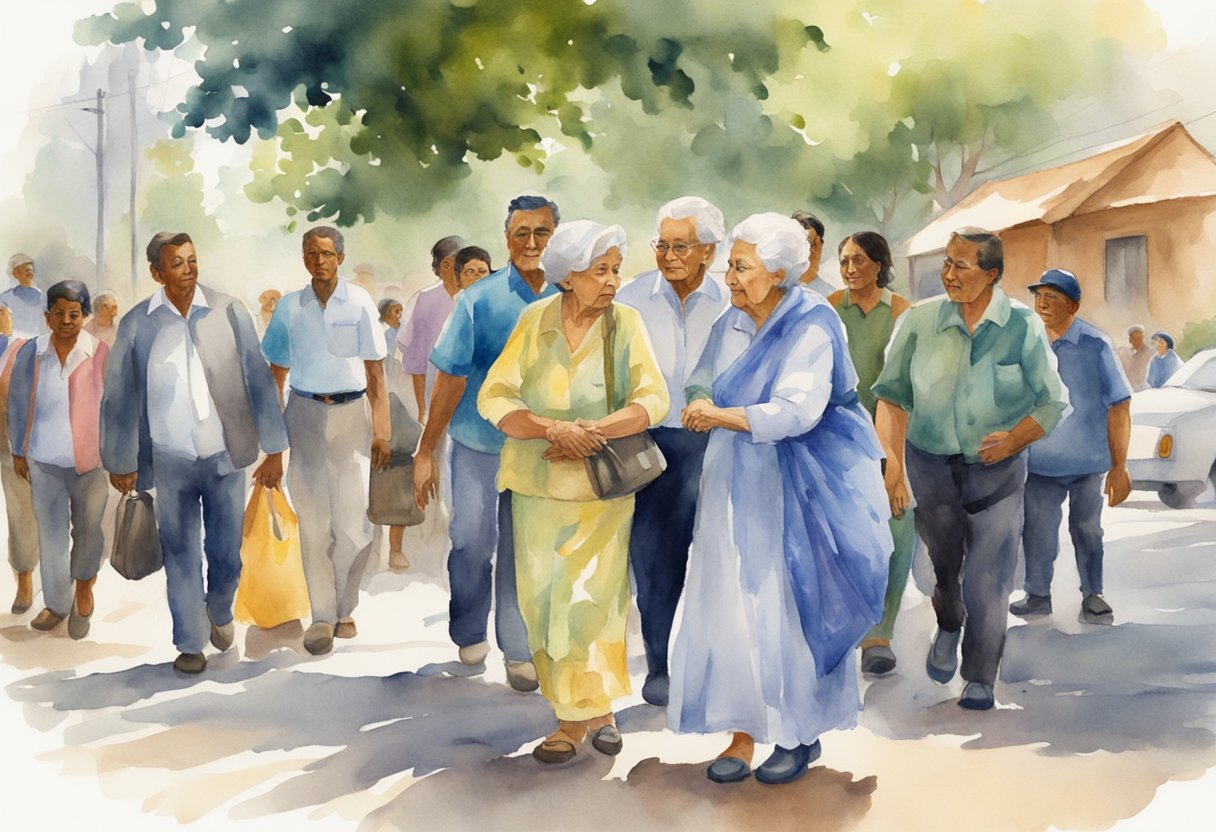

Showing respect and love for the elderly is essential in Christian communities. It reflects admiration for their wisdom and life experiences. Here are some practical ways to express this respect.
Celebrating the Elderly in the Church
Celebrating elders in the church can strengthen family and community ties. Special events like birthday parties or anniversary celebrations can honor their contributions.
During church services, recognizing their achievements, stories, and milestones can bring joy. For instance, dedicating a service to share testimonies allows younger members to appreciate their faith journeys.
Additionally, creating a “Wall of Honor” in the church can showcase photographs and stories of cherished seniors. This not only respects the elders but also provides inspiration for others.
Teaching the Younger Generations
It’s important for younger generations to learn about respect and love towards elders. Church groups can facilitate workshops or discussions to discuss the value of honoring those with gray hair.

Parents can model respectful behavior at home. Simple acts like listening attentively and asking questions show young people how to value elders.
Involving younger members in activities with seniors fosters relationships. Children can visit elder members, write letters, or perform songs. These moments promote admiration and understanding between generations.
Encouraging a Life of Service
Encouraging elders to engage in service enriches their lives and the community. Many seniors have skills and experiences to share.
By inviting them to lead workshops or craft classes, they can pass on their knowledge.
Creating opportunities for elders to volunteer, even in small ways, boosts their confidence. This could include helping with church events or mentoring younger members.

Additionally, ensuring that the community treats them with respect during these activities reinforces their value.
Challenges of Aging and the Christian Response
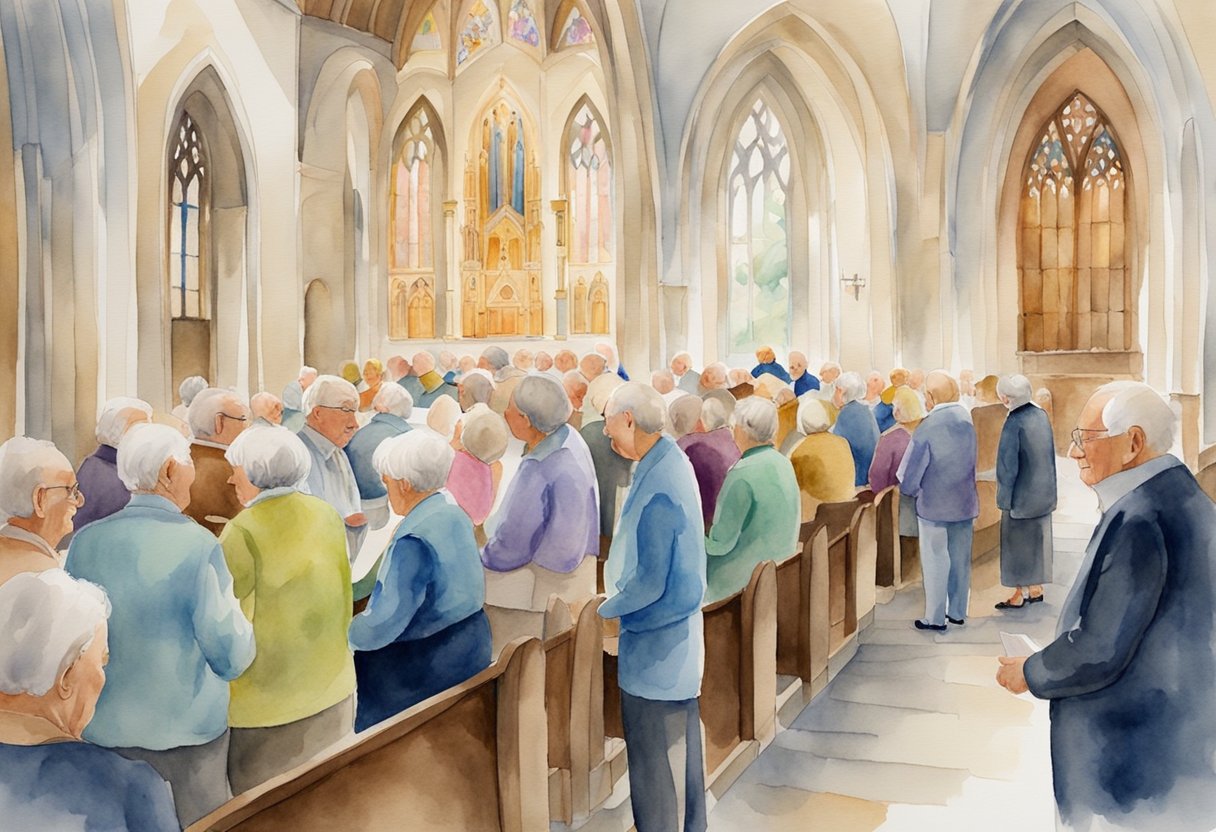
Aging brings various challenges that affect the elderly physically, socially, and emotionally. Addressing these challenges is vital for families and communities to show love, humility, and respect.
Dealing With Physical Changes
As people age, they may experience numerous physical changes. Common issues include reduced mobility, chronic pain, and declining health. Many seniors face difficulty with daily activities, such as bathing, dressing, and cooking.
Christian communities can support the elderly by providing resources and assistance. Visiting homebound individuals and offering help with chores or errands shows care.

Encouraging physical activity, like gentle exercises, helps maintain health. Churches often organize programs for seniors to promote friendship and fitness, creating a sense of belonging while addressing physical needs.
Addressing Social and Emotional Needs
Loneliness is a significant challenge for many elderly individuals. Social connections often diminish as friends and family members pass away or become less available. This isolation can lead to anxiety and depression.
In response, Christian communities should foster environments that encourage social interaction. Organizing group activities, such as Bible studies or game nights, can help seniors connect.
Additionally, offering volunteer opportunities allows elderly individuals to contribute, combating feelings of uselessness. Family support is essential; regular visits and phone calls make a positive difference in their emotional well-being.
Maintaining Dignity in Care
Preserving dignity is crucial for elderly individuals receiving care. As they require assistance with daily tasks, respecting their autonomy is paramount.

Many elderly people may feel vulnerable and dependent on caregivers.
Christian families and communities should prioritize dignity by involving seniors in decision-making about their care. Open communication is key.
Listening to their preferences fosters respect and maintains a sense of control. Creating a caring environment where the elderly feel valued and loved is essential.
Promises and Encouragements for the Elderly
The elderly are often filled with wisdom and experiences that should be honored. Scripture provides promises and encouragements that highlight the hope and strength available as they age.
Scriptural Promises for Long Life and Prosperity

The Bible offers many promises about long life for those who live righteously. For instance, Proverbs 3:1-2 states, “My son, do not forget my teaching, but let your heart keep my commandments; for length of days and years of life and peace will be added to you.”
This shows that following God’s ways can lead to a fulfilling life.
Another encouraging verse is found in Ecclesiastes 3:12-13, which says, “I perceived that there is nothing better for them than to be joyful and to do good as long as they live.”
This highlights that enjoying life and doing good can bring lasting joy, even in old age. The promise of long life is often tied to a life lived in righteousness.
Strength and Hope in Aging
Aging can bring uncertainty, but it also comes with strength and hope. Joshua 14:10 reminds the elderly that God has been faithful throughout their lives. It states, “I am this day eighty-five years old. I am still as strong today as I was in the day that Moses sent me.”

This shows that strength doesn’t fade with age; it can remain steadfast.
The elderly can draw hope from God’s continued presence in their lives. Psalms 92:14 says, “They still bear fruit in old age; they are ever full of sap and green.”
This assures them of purpose and vitality, no matter their age. They are encouraged to embrace this season of life with confidence and joy.
Living a Righteous Life in Senior Years
In their senior years, individuals often seek to live a life that reflects their faith and wisdom. This time can be rich with purpose, as they focus on understanding God’s will and leaving a meaningful legacy.
Understanding and Living Out God’s Purpose
For many seniors, discerning God’s purpose can be a vital and fulfilling journey. They may spend more time in prayer and reflection, seeking wisdom in scripture.
Participating in church activities like volunteering or teaching others allows them to share their knowledge. Surrounding themselves with younger members of the church can also foster relationships that enrich both parties.
In this phase of life, commitment to righteous living can manifest in small, everyday actions. Simple gestures, like showing kindness or offering guidance, become vital expressions of their faith.
The Legacy of Faith and Righteousness
Building a legacy rooted in faith is important for seniors. They aim to pass down values of righteousness and integrity to younger generations. Sharing stories of their faith journeys can inspire others, reinforcing the importance of spirituality.
Many seniors take time to document their experiences and lessons learned through life. This can take the form of written letters, journals, or even video recordings. These personal insights serve not only as a record but also as a source of encouragement for future generations.
Living a righteous life in senior years involves a combination of faith, wisdom, and intentionality. It encourages deeper connections with God and the community.
Conclusion
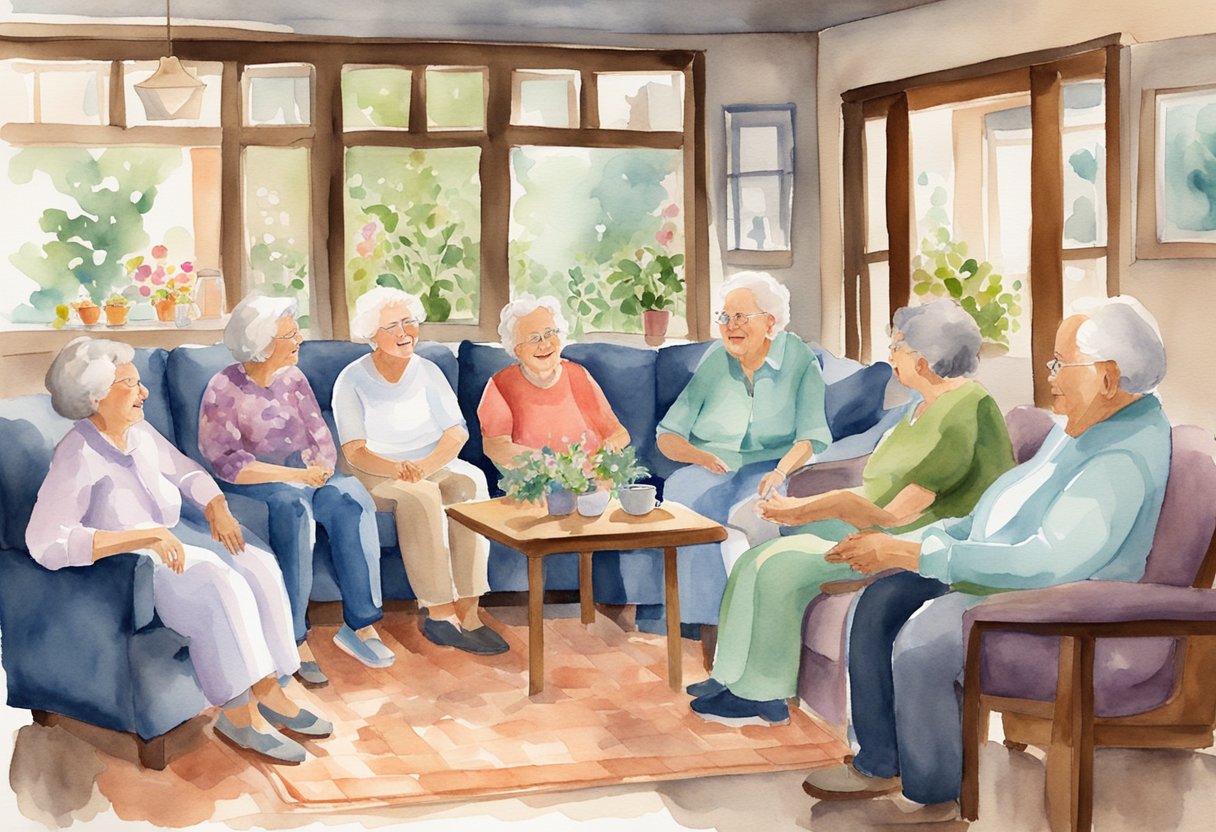
Honoring the elderly is a vital part of Christian teaching. It emphasizes respect and love for those who have shaped lives and communities.
Many scriptures call for caring for older individuals. This includes providing emotional and physical support. Churches are encouraged to create programs that uplift and serve the elderly.
The Christian response should be one of compassion. Understanding the needs of seniors helps strengthen church bonds. Active involvement can benefit both the elderly and younger generations.
In families, honoring elders fosters connection. It teaches younger members the value of respect and tradition. Engaging with seniors can be enriching and rewarding for everyone involved.
Churches and individuals alike can benefit from nurturing these relationships. By showing honor and love, they promote a culture of respect. This not only helps the elderly but also builds a stronger community.












